SOWK 486w Fall 2022 An Overview: Direct Social Work Practice Jacob Campbell, LICSW at Heritage University
Slide 1

Slide 2

Agenda • How we help • Orienting perspectives for social work practice • Evidence-based practice • Involuntary clients • Ecological Systems Model • Social work jobs and roles SOWK 486w Fall 2022 Jacob Campbell, LICSW at Heritage University
Slide 3

“You can close your eyes to the things you don’t want to see, but you can’t close your heart to the things you don’t want to feel.” —Johnny Depp
Slide 4

Recall a time that you were experiencing an intense emotional di culty and were comforted and supported How did you “know” that person was supportive What behaviors and words did that person use that was helpful to you ffi List these on your poster for future reference
Slide 5

Prevention The timely provision of services to vulnerable persons, promoting social functioning before problems develop. Remediation The timely provision of services to vulnerable persons, promoting social functioning before problems develop. The Purpose of Social Work Restoration E orts to restore functioning that has been impaired by physical or mental di culties (Heptworth et al., 2017) ffi ff SOWK 486w Fall 2022 Jacob Campbell, LICSW at Heritage University
Slide 6
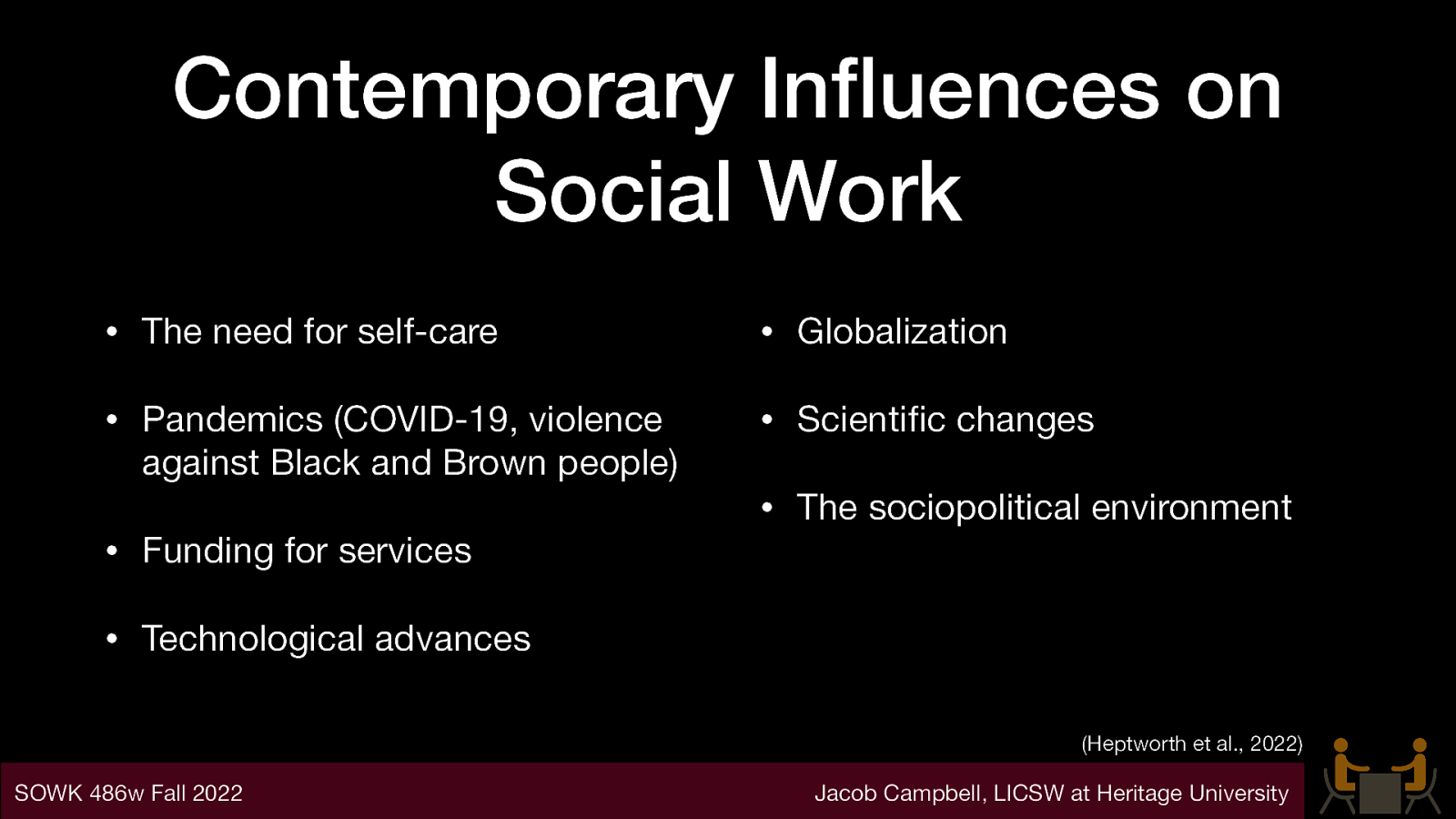
Contemporary In uences on Social Work • The need for self-care • Globalization • Pandemics (COVID-19, violence against Black and Brown people) • Scienti c changes • The sociopolitical environment • Funding for services • Technological advances (Heptworth et al., 2022) Jacob Campbell, LICSW at Heritage University fl fi SOWK 486w Fall 2022
Slide 7

Dignity & Worth Competence NASW Core Values Integrity Service SOCIAL JUSTICE SOWK 486w Fall 2022 Relationships Jacob Campbell, LICSW at Heritage University
Slide 8
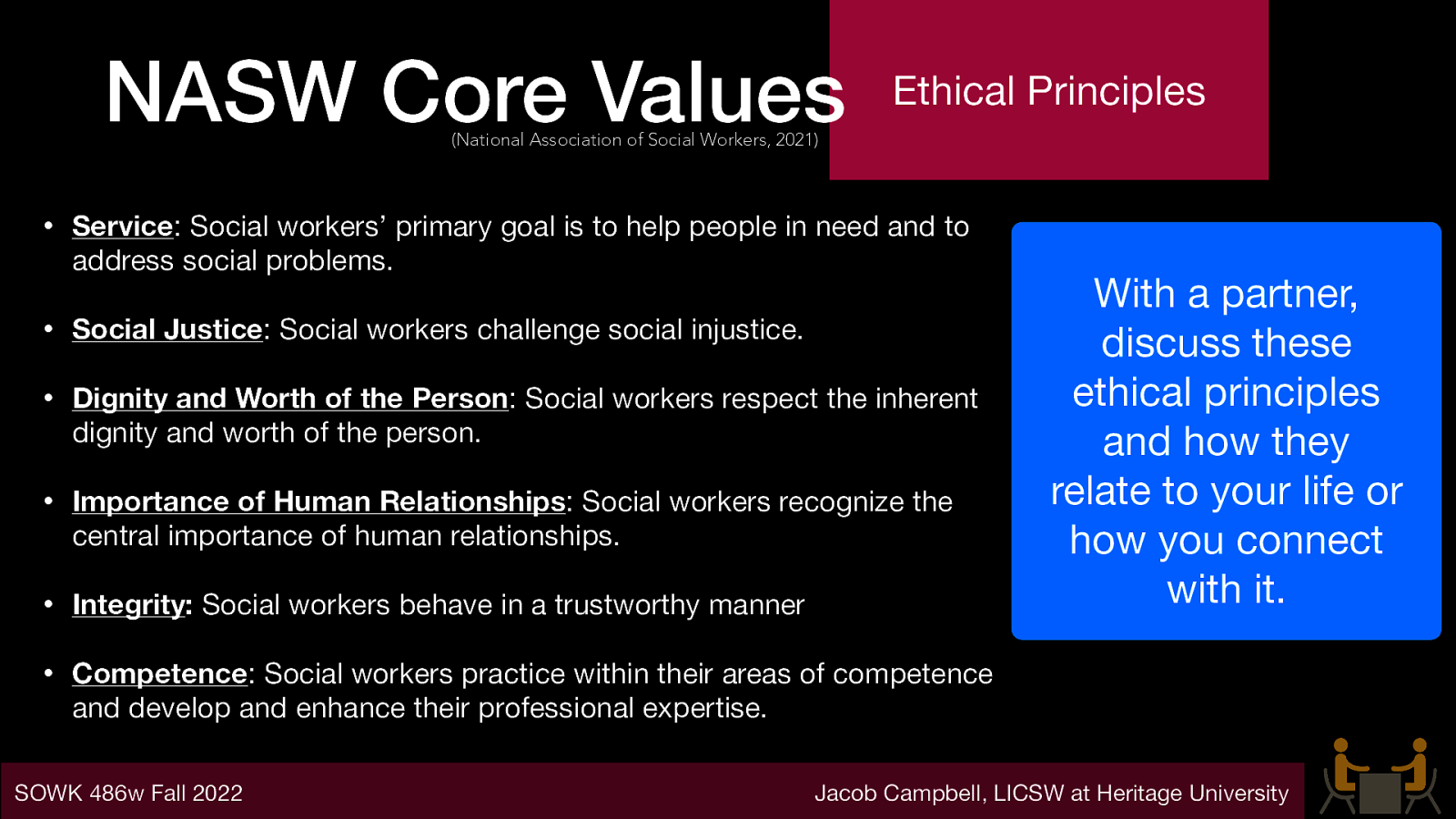
NASW Core Values Ethical Principles (National Association of Social Workers, 2021) • Service: Social workers’ primary goal is to help people in need and to address social problems. • Social Justice: Social workers challenge social injustice. • Dignity and Worth of the Person: Social workers respect the inherent dignity and worth of the person. • Importance of Human Relationships: Social workers recognize the central importance of human relationships. • Integrity: Social workers behave in a trustworthy manner • Competence: Social workers practice within their areas of competence and develop and enhance their professional expertise. SOWK 486w Fall 2022 With a partner, discuss these ethical principles and how they relate to your life or how you connect with it. Jacob Campbell, LICSW at Heritage University
Slide 9
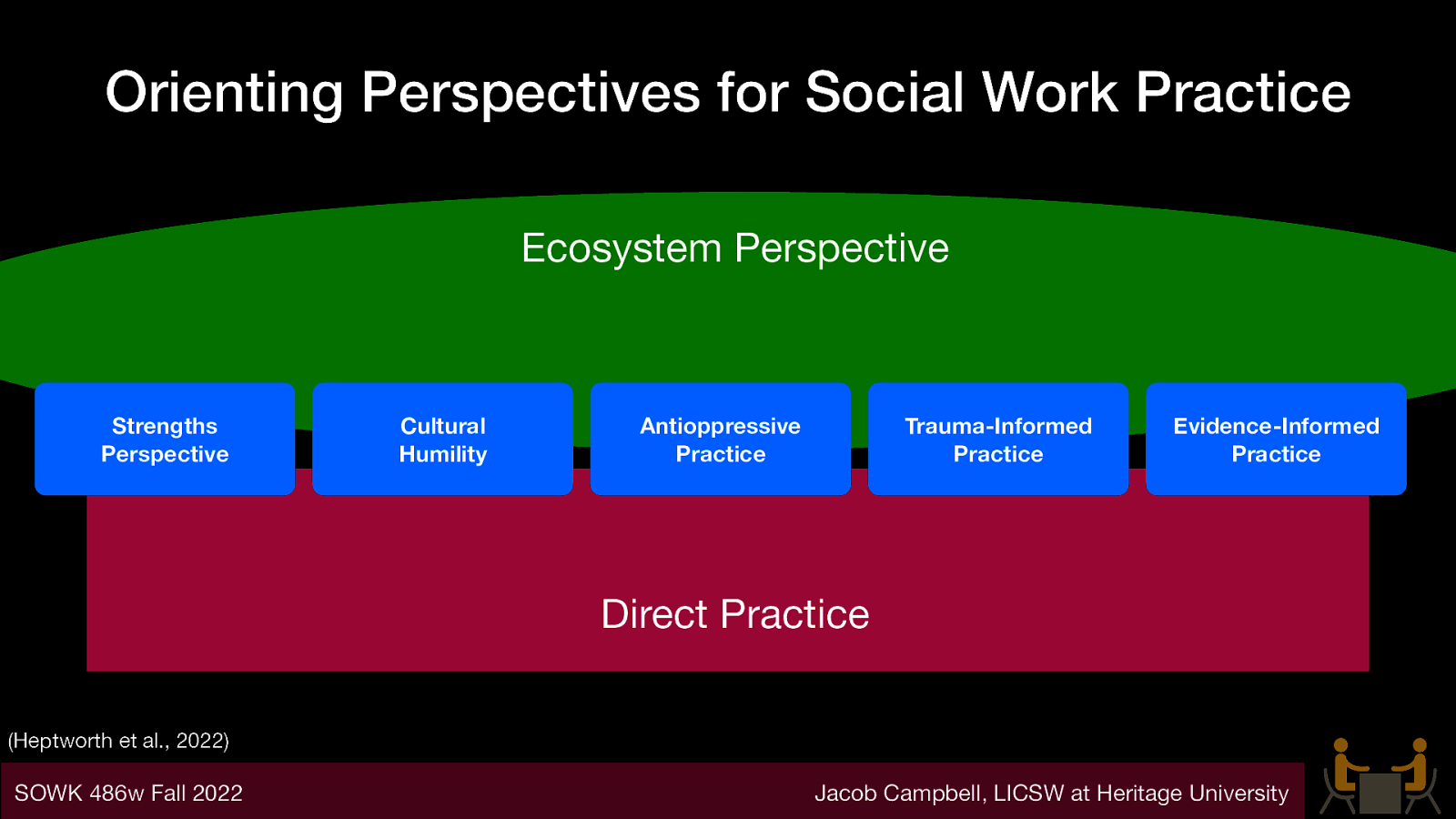
Orienting Perspectives for Social Work Practice Ecosystem Perspective Strengths Perspective Cultural Humility Antioppressive Practice Trauma-Informed Practice Evidence-Informed Practice Direct Practice (Heptworth et al., 2022) SOWK 486w Fall 2022 Jacob Campbell, LICSW at Heritage University
Slide 10
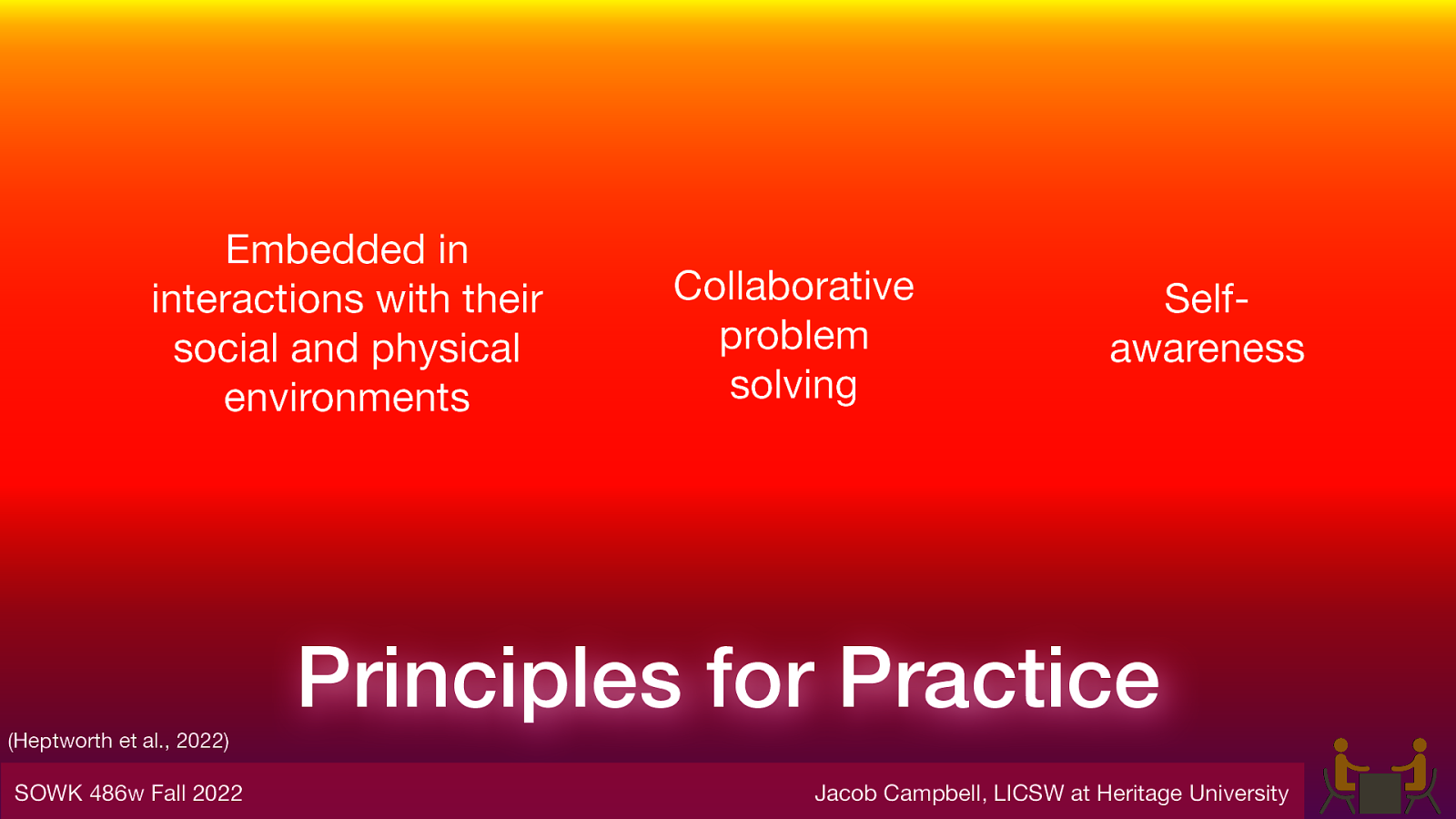
Embedded in interactions with their social and physical environments Collaborative problem solving Selfawareness Principles for Practice (Heptworth et al., 2022) SOWK 486w Fall 2022 Jacob Campbell, LICSW at Heritage University
Slide 11
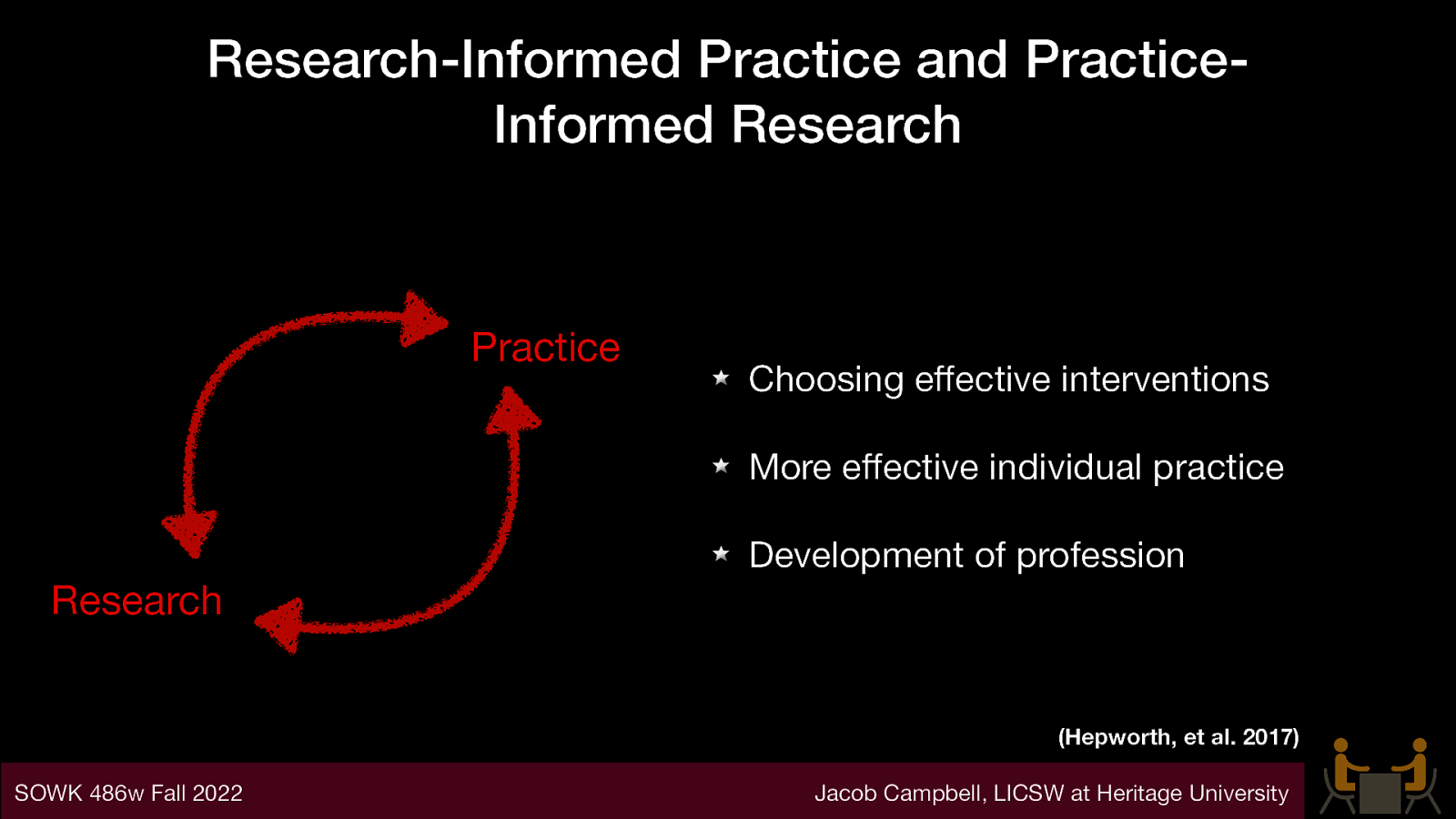
Research-Informed Practice and PracticeInformed Research Practice Choosing e ective interventions More e ective individual practice Development of profession Research (Hepworth, et al. 2017) ff ff SOWK 486w Fall 2022 Jacob Campbell, LICSW at Heritage University
Slide 12
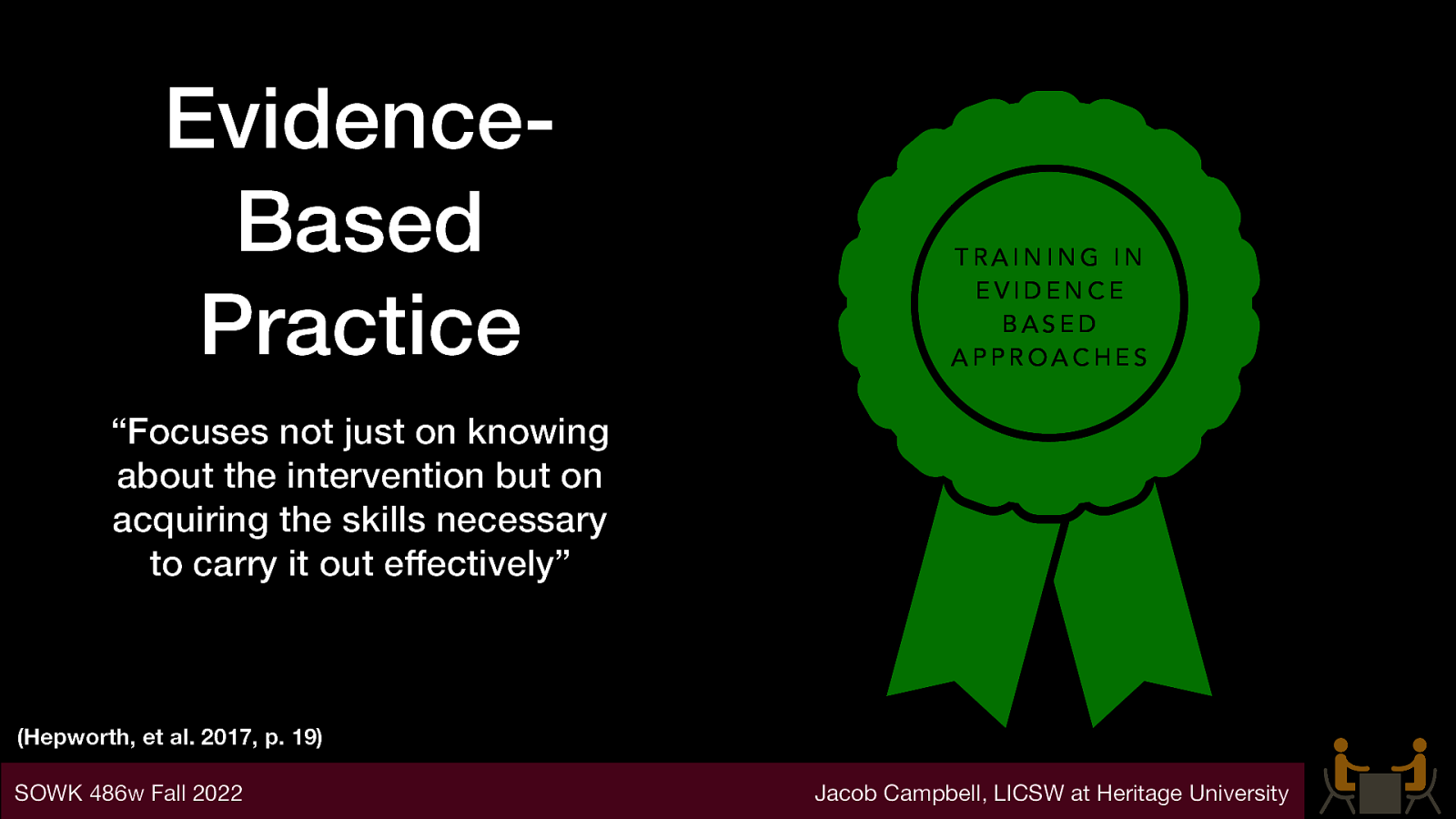
EvidenceBased Practice TRAINING IN EVIDENCE BASED APPROACHES “Focuses not just on knowing about the intervention but on acquiring the skills necessary to carry it out effectively” (Hepworth, et al. 2017, p. 19) SOWK 486w Fall 2022 Jacob Campbell, LICSW at Heritage University
Slide 13
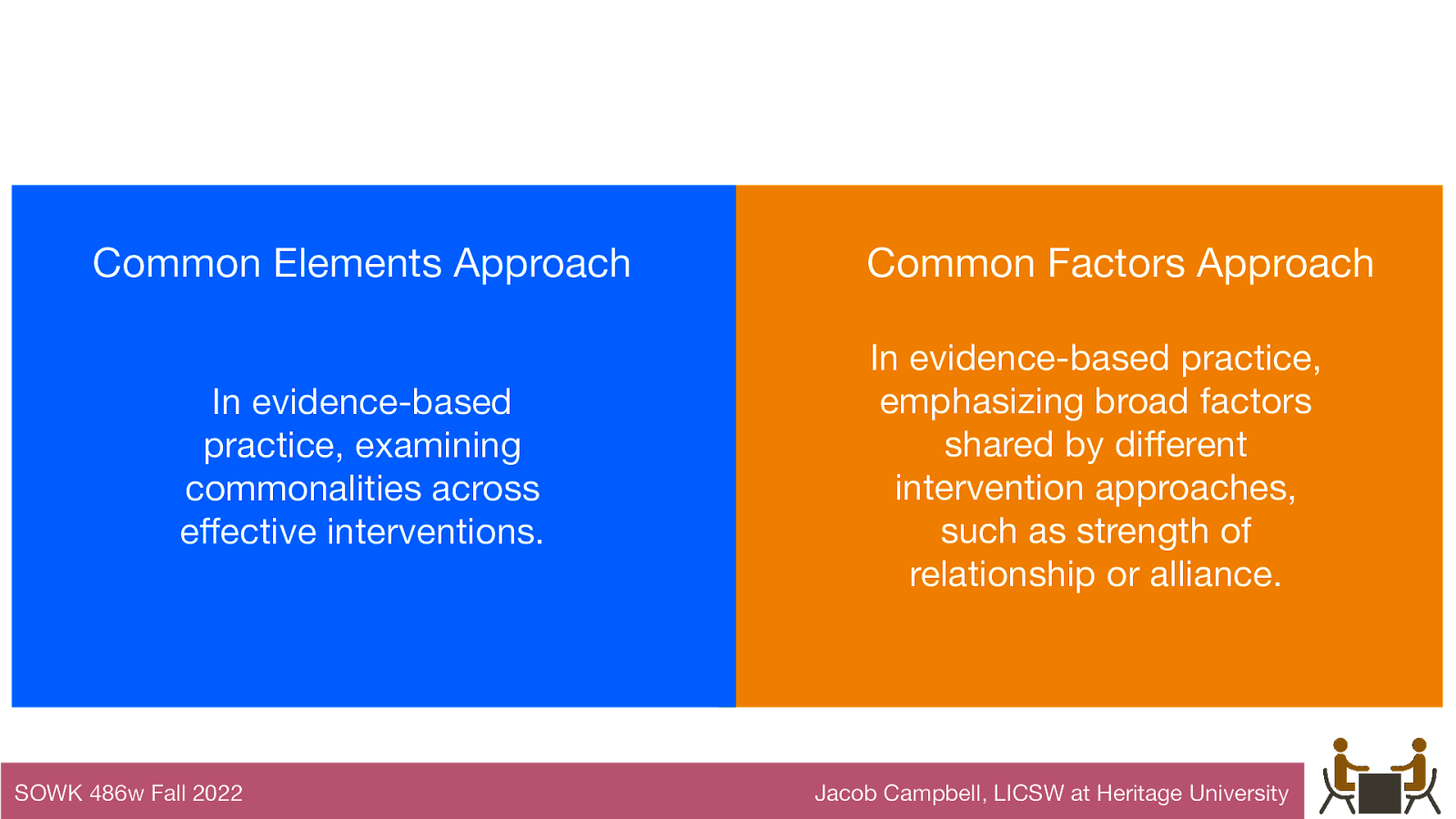
Evidence-Based Practice Common Elements Approach In evidence-based practice, examining commonalities across e ective interventions. Common Factors Approach In evidence-based practice, emphasizing broad factors shared by di erent intervention approaches, such as strength of relationship or alliance. (Hepworth, et al. 2017) ff ff SOWK 486w Fall 2022 Jacob Campbell, LICSW at Heritage University
Slide 14
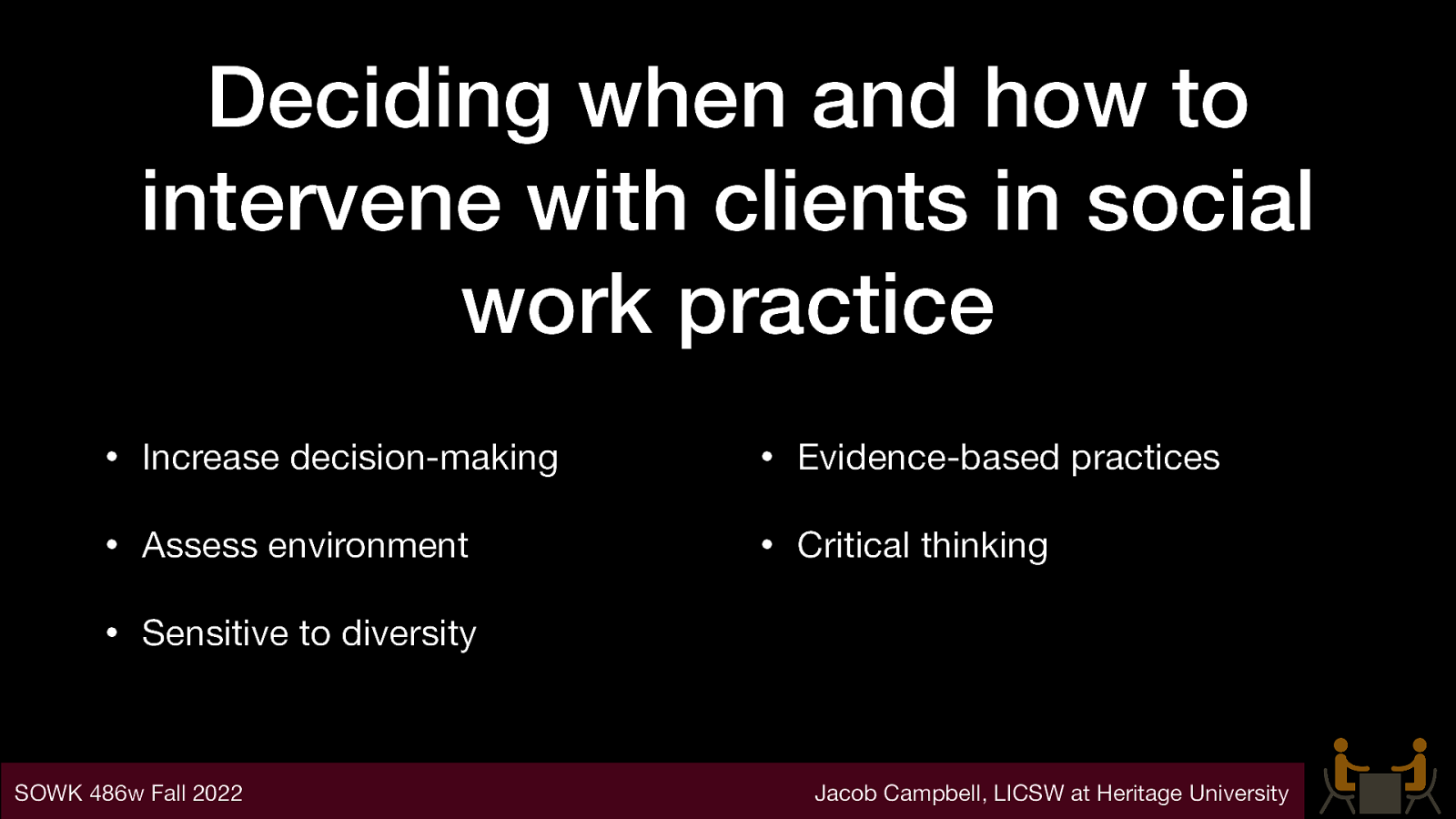
Deciding when and how to intervene with clients in social work practice • Increase decision-making • Evidence-based practices • Assess environment • Critical thinking • Sensitive to diversity SOWK 486w Fall 2022 Jacob Campbell, LICSW at Heritage University
Slide 15

De ne Critical Thinking Skills and Apply Them to Practice To think critically, think RED R ecognize assumptions Keys to Critical Thinking E valuate arguments D raw conclusions (Watson-Glaser, 1925) fi SOWK 486w Fall 2022 Jacob Campbell, LICSW at Heritage University
Slide 16
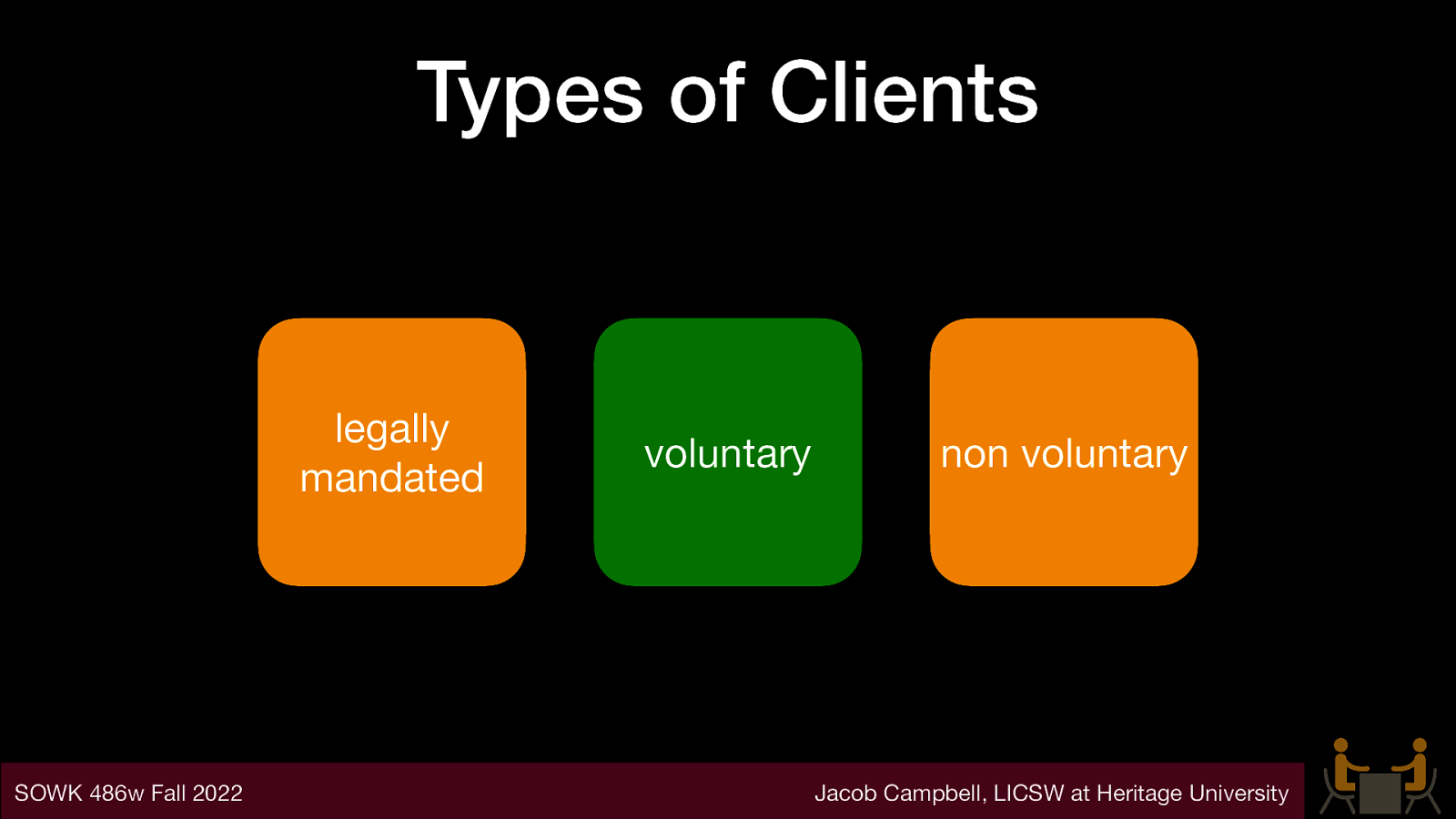
Types of Clients legally mandated SOWK 486w Fall 2022 voluntary non voluntary Jacob Campbell, LICSW at Heritage University
Slide 17
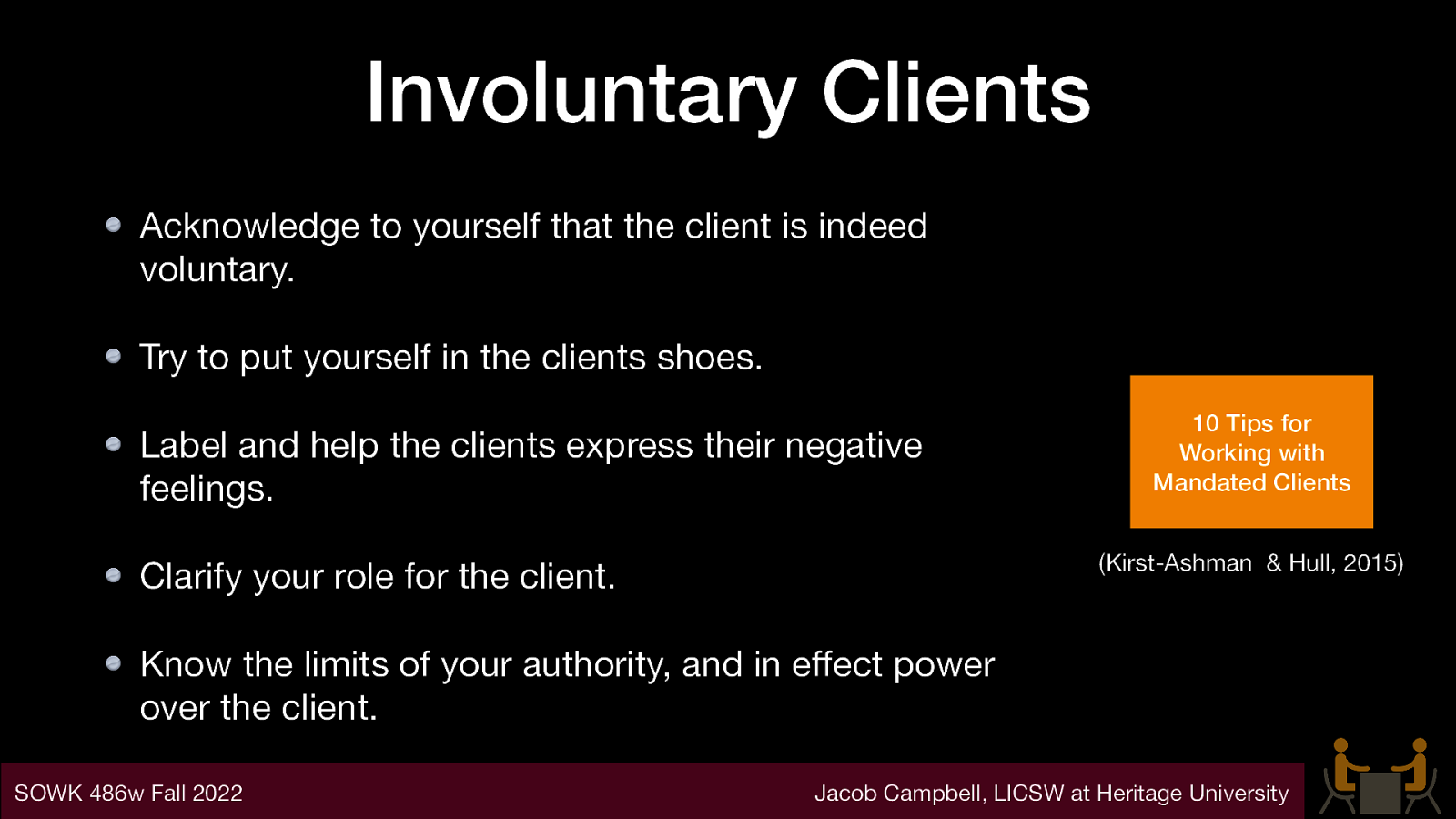
Involuntary Clients Acknowledge to yourself that the client is indeed voluntary. Try to put yourself in the clients shoes. Label and help the clients express their negative feelings. 10 Tips for Working with Mandated Clients (Kirst-Ashman & Hull, 2015) Clarify your role for the client. Know the limits of your authority, and in e ect power over the client. Jacob Campbell, LICSW at Heritage University ff SOWK 486w Fall 2022
Slide 18
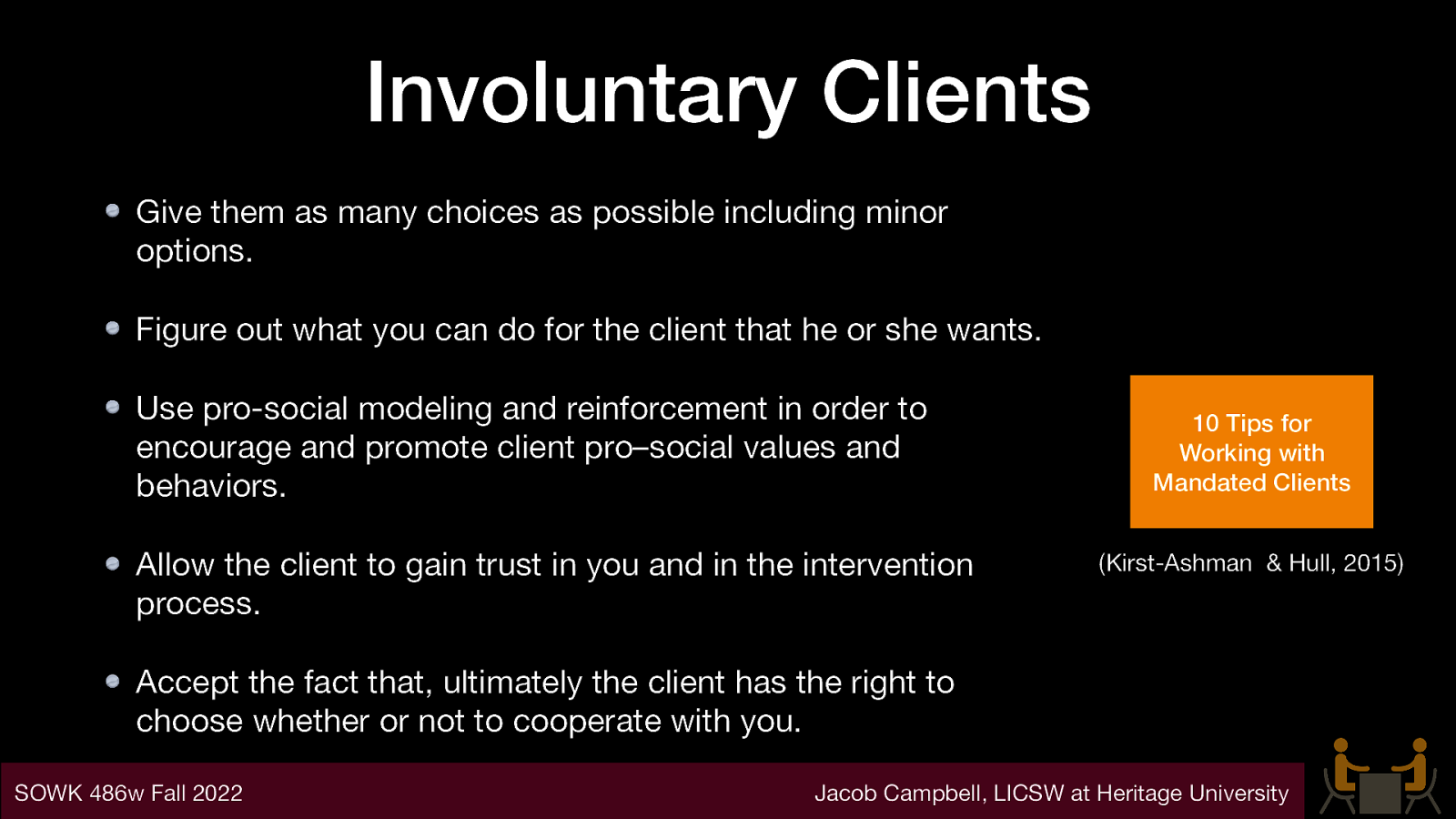
Involuntary Clients Give them as many choices as possible including minor options. Figure out what you can do for the client that he or she wants. Use pro-social modeling and reinforcement in order to encourage and promote client pro–social values and behaviors. Allow the client to gain trust in you and in the intervention process. 10 Tips for Working with Mandated Clients (Kirst-Ashman & Hull, 2015) Accept the fact that, ultimately the client has the right to choose whether or not to cooperate with you. SOWK 486w Fall 2022 Jacob Campbell, LICSW at Heritage University
Slide 19
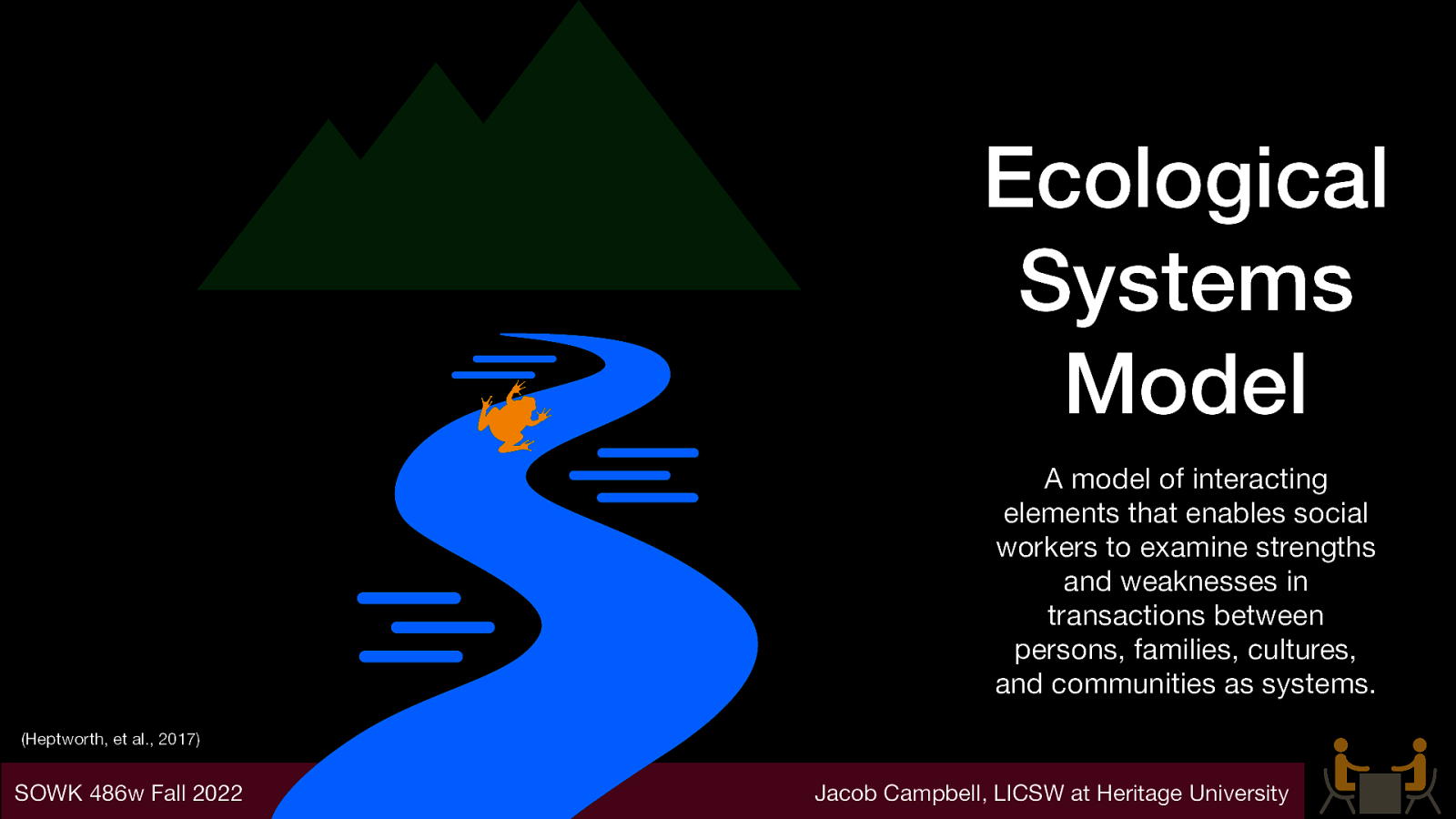
Ecological Systems Model A model of interacting elements that enables social workers to examine strengths and weaknesses in transactions between persons, families, cultures, and communities as systems. (Heptworth, et al., 2017) SOWK 486w Fall 2022 Jacob Campbell, LICSW at Heritage University
Slide 20
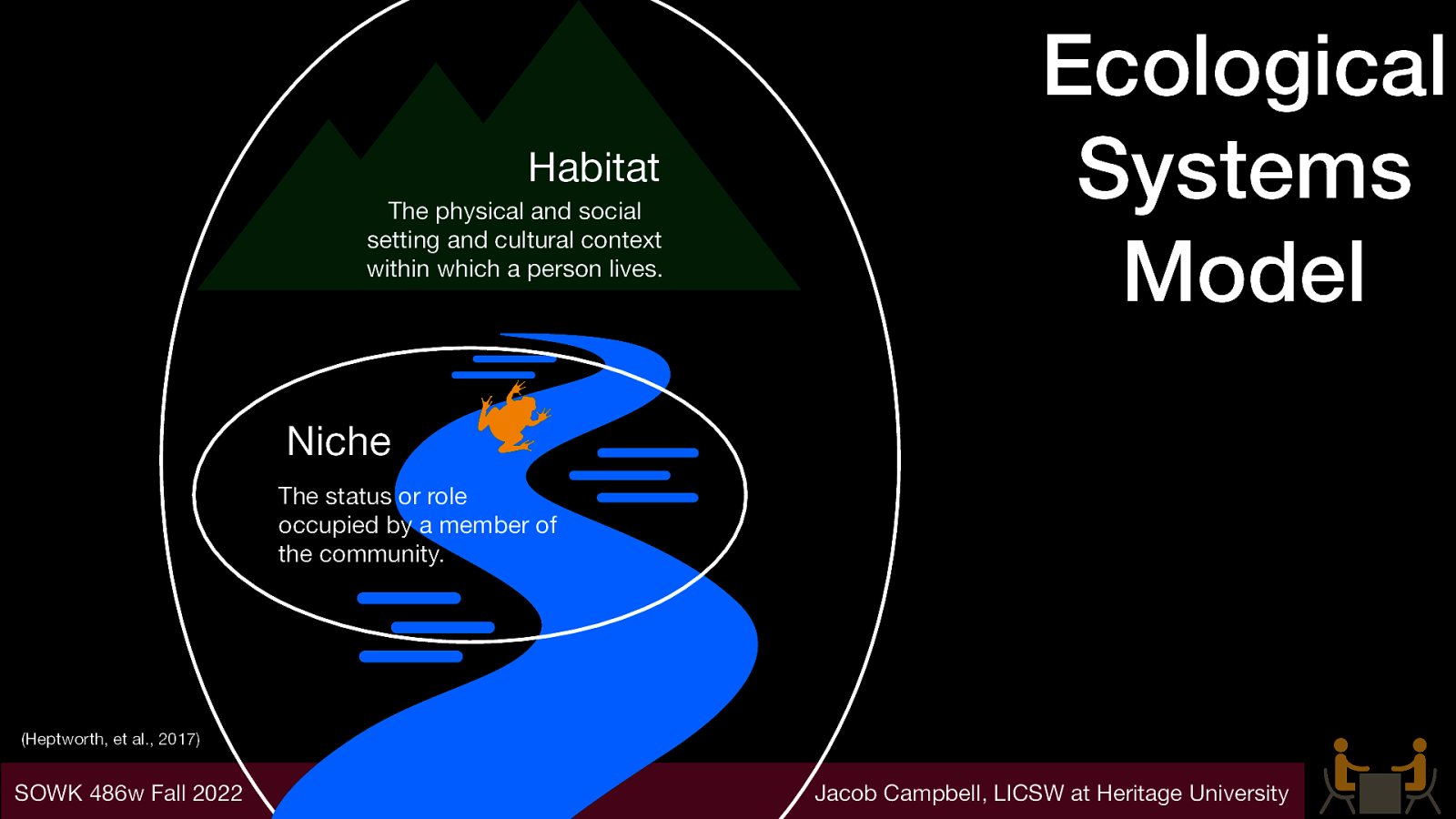
Habitat The physical and social setting and cultural context within which a person lives. Ecological Systems Model Niche The status or role occupied by a member of the community. (Heptworth, et al., 2017) SOWK 486w Fall 2022 Jacob Campbell, LICSW at Heritage University
Slide 21
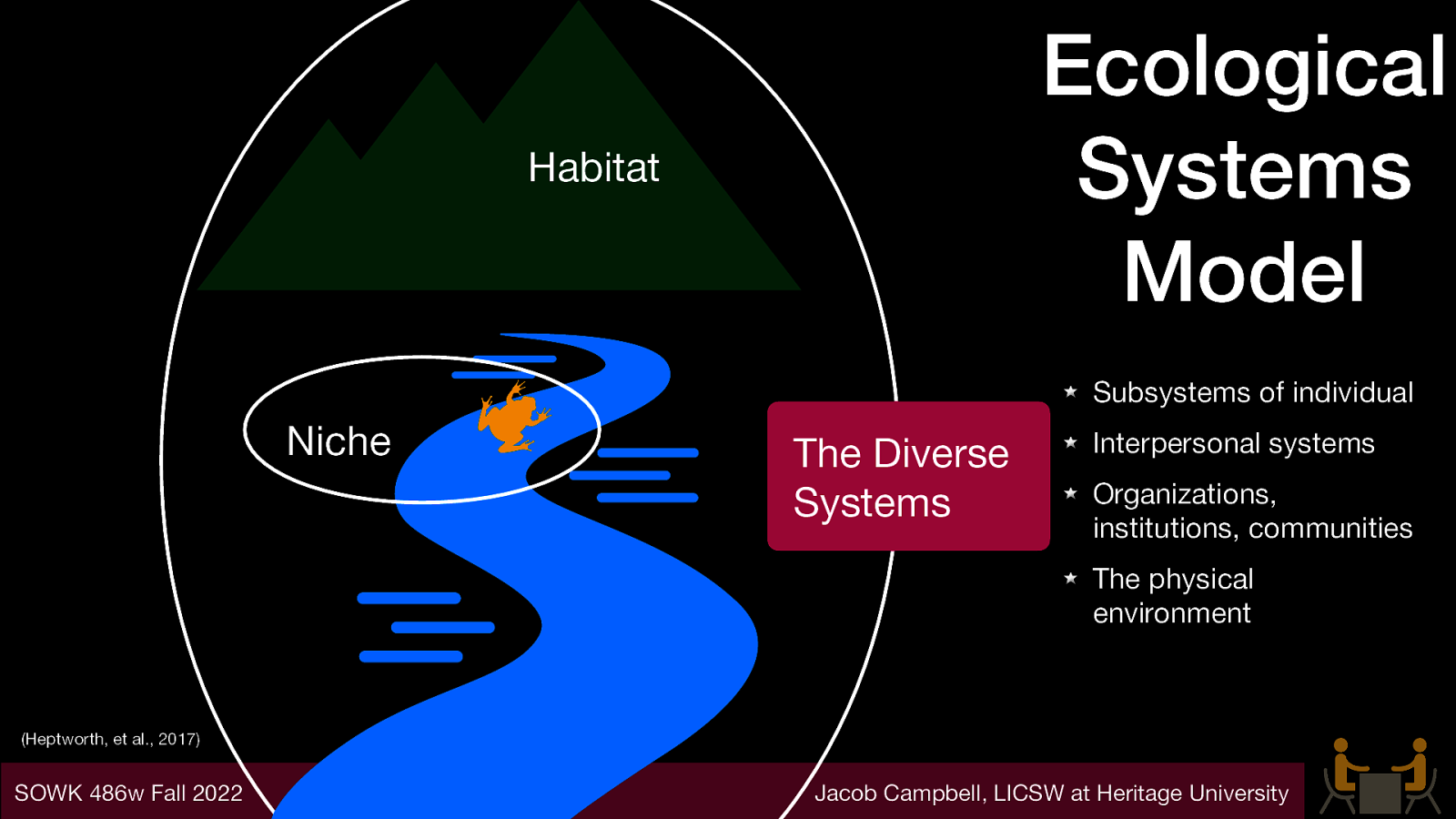
Ecological Systems Model Habitat Subsystems of individual Niche The Diverse Systems Interpersonal systems Organizations, institutions, communities The physical environment (Heptworth, et al., 2017) SOWK 486w Fall 2022 Jacob Campbell, LICSW at Heritage University
Slide 22
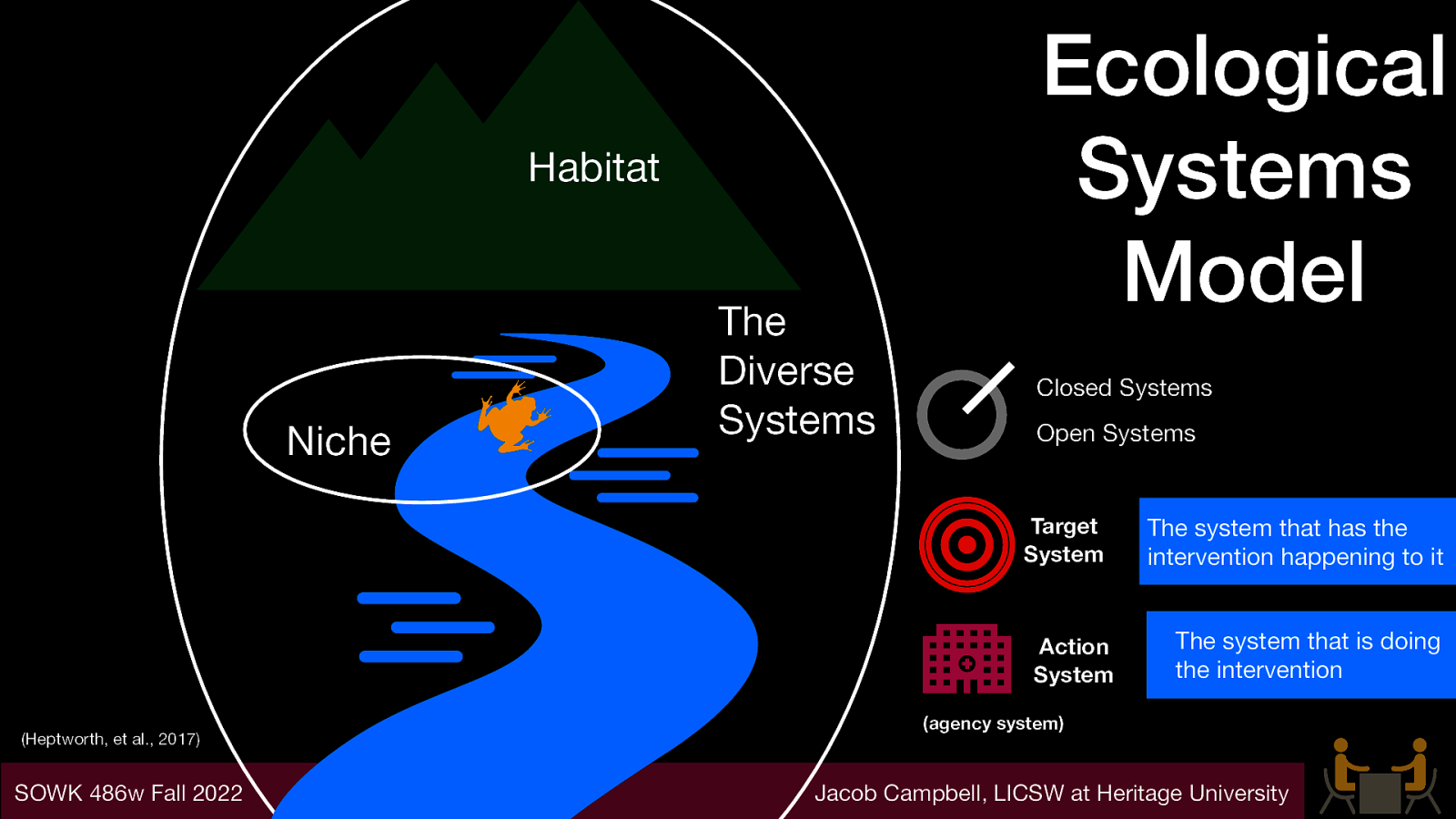
Habitat Niche The Diverse Systems Ecological Systems Model Closed Systems Open Systems Target System Action System (Heptworth, et al., 2017) SOWK 486w Fall 2022 The system that has the intervention happening to it The system that is doing the intervention (agency system) Jacob Campbell, LICSW at Heritage University
Slide 23
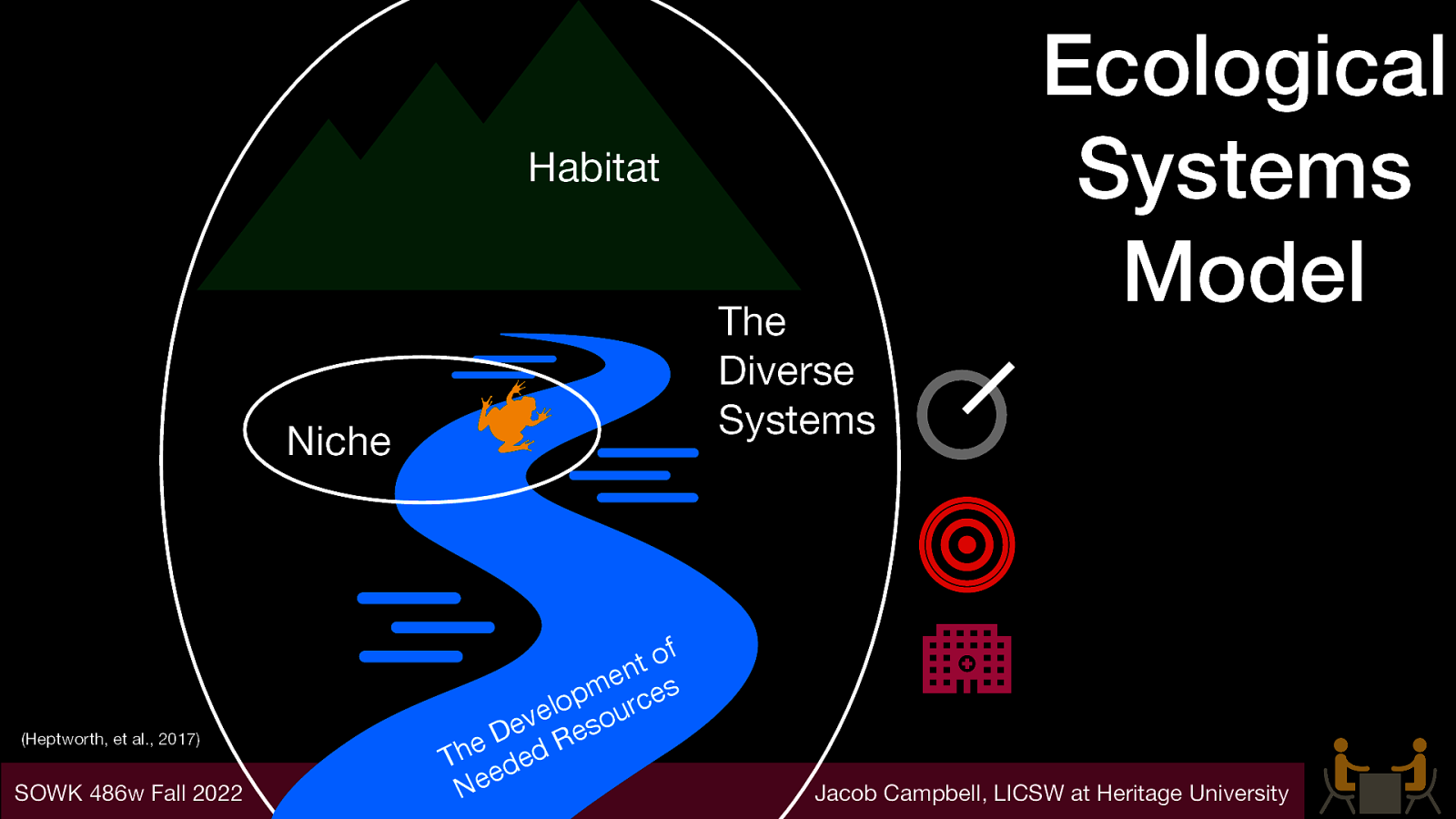
Habitat The Diverse Systems Niche (Heptworth, et al., 2017) SOWK 486w Fall 2022 f o t n e m ces p o l r e u v eso e D R e Th ded e e N Ecological Systems Model Jacob Campbell, LICSW at Heritage University
Slide 24
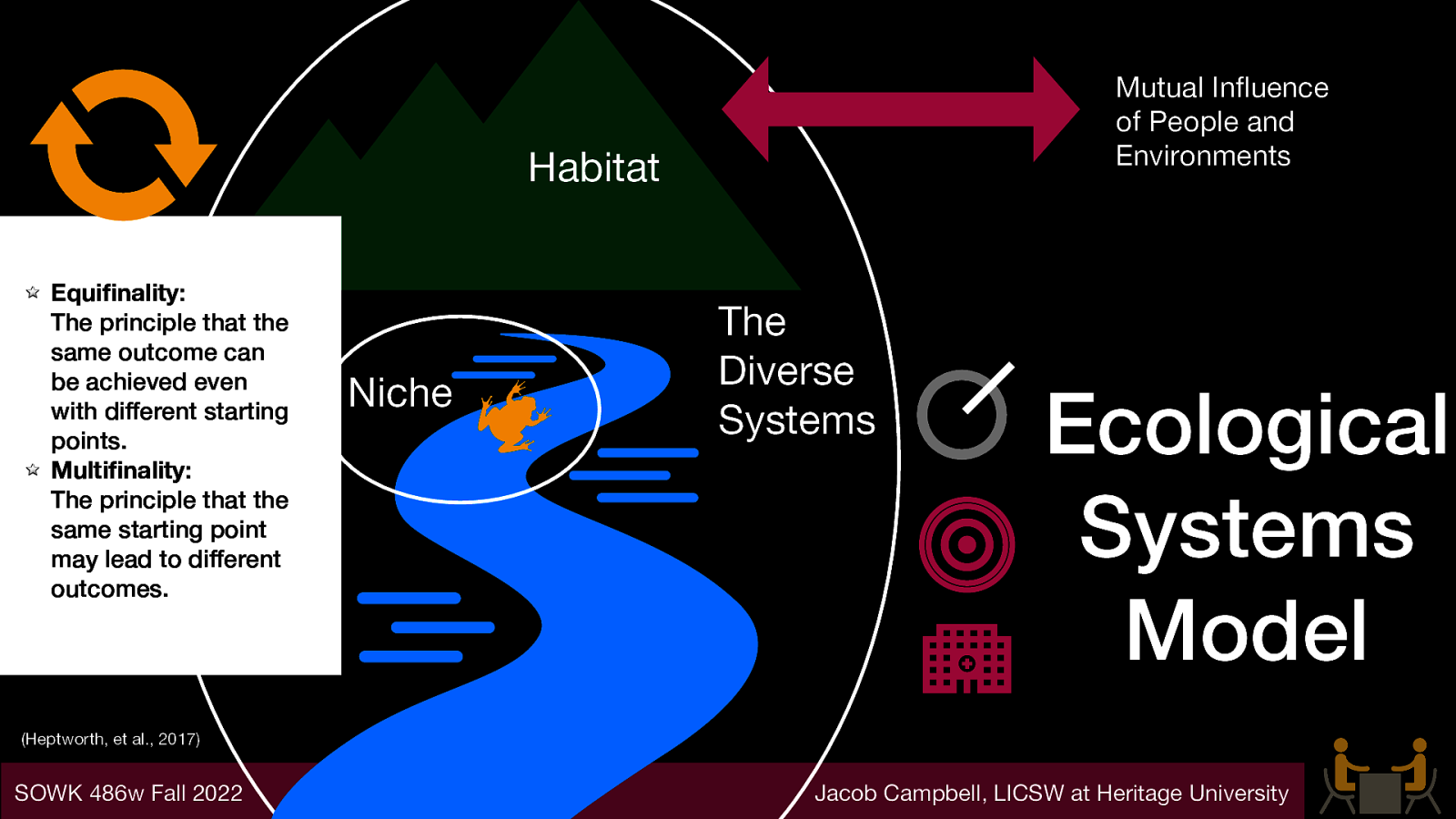
Mutual In uence of People and Environments Habitat Equi nality: The principle that the same outcome can be achieved even with different starting points. Multi nality: The principle that the same starting point may lead to different outcomes. Niche The Diverse Systems Ecological Systems Model (Heptworth, et al., 2017) fl fi fi SOWK 486w Fall 2022 Jacob Campbell, LICSW at Heritage University
Slide 25
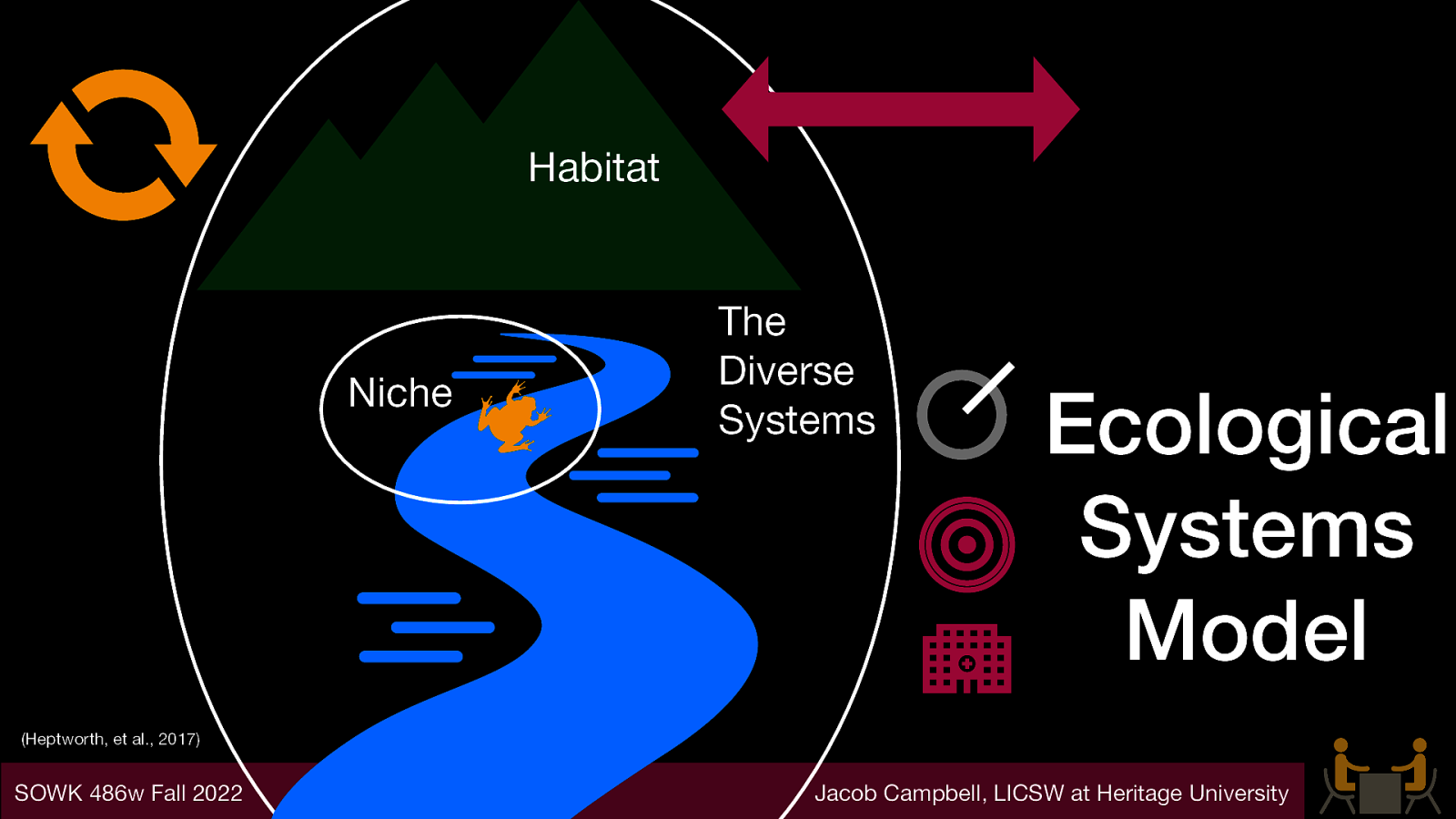
Habitat Niche The Diverse Systems Ecological Systems Model (Heptworth, et al., 2017) SOWK 486w Fall 2022 Jacob Campbell, LICSW at Heritage University
Slide 26
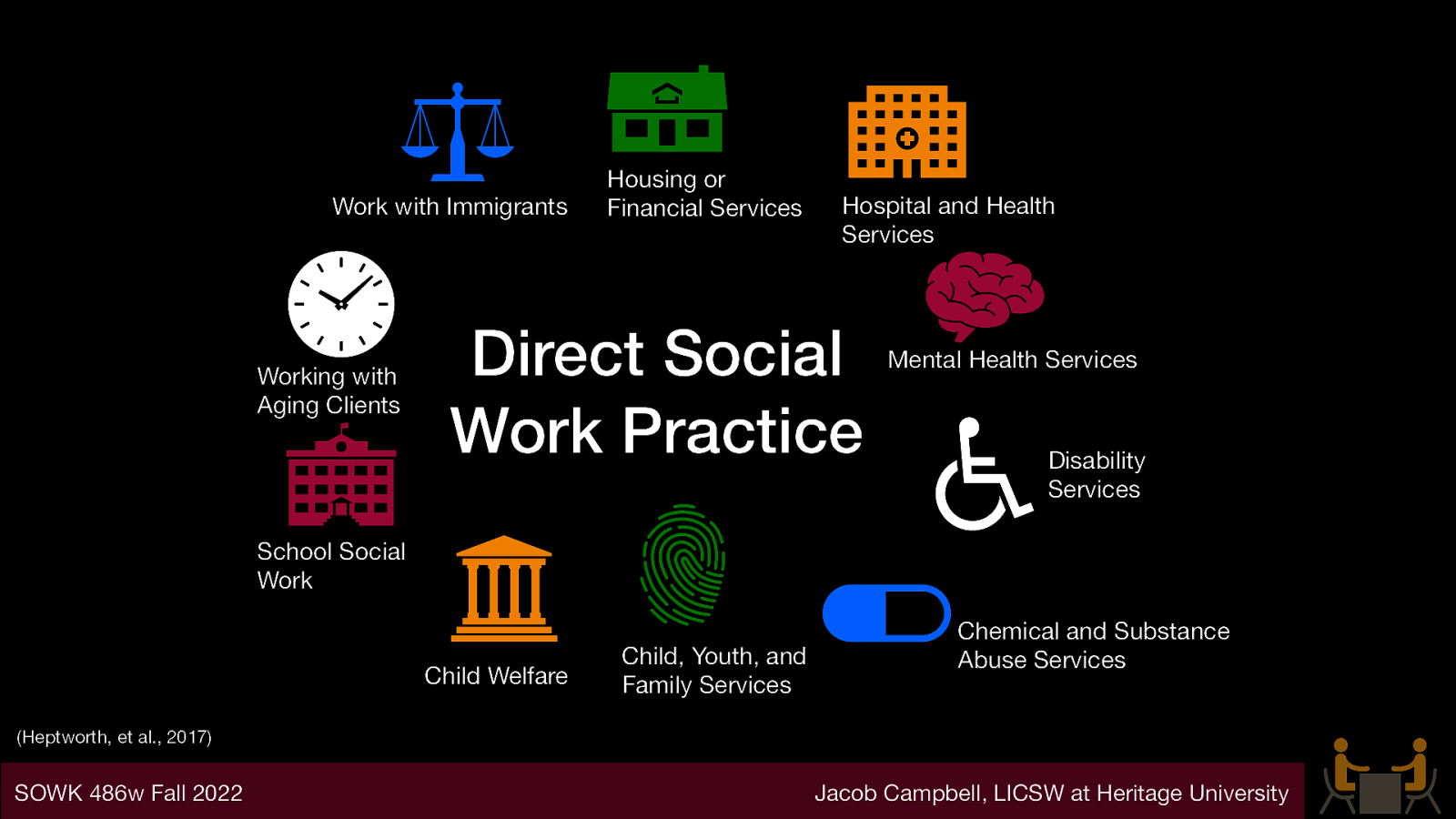
Work with Immigrants Working with Aging Clients Housing or Financial Services Hospital and Health Services Direct Social Work Practice Mental Health Services Disability Services School Social Work Child Welfare Child, Youth, and Family Services Chemical and Substance Abuse Services (Heptworth, et al., 2017) SOWK 486w Fall 2022 Jacob Campbell, LICSW at Heritage University
Slide 27
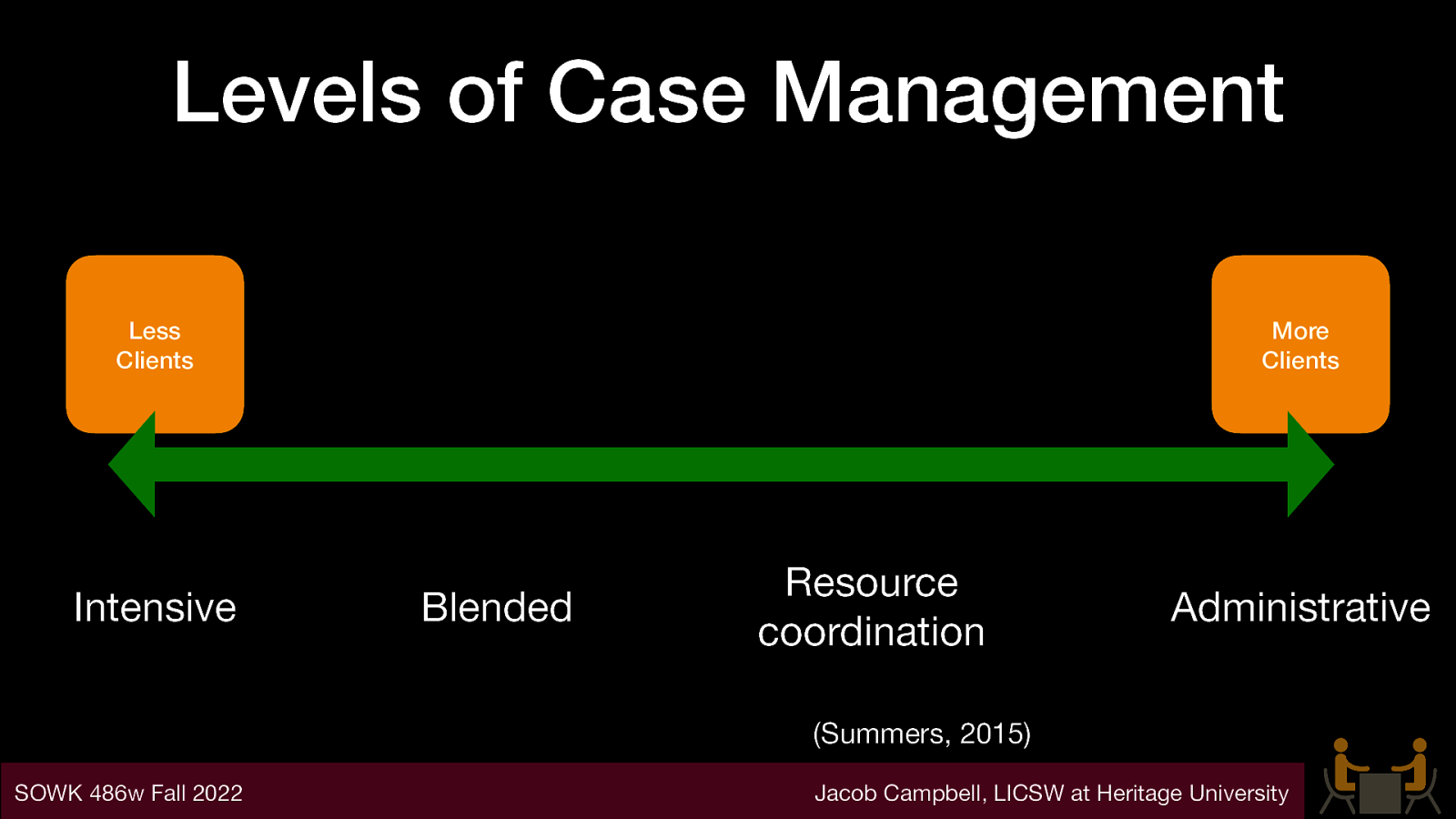
Levels of Case Management Less Clients Intensive More Clients Blended Resource coordination Administrative (Summers, 2015) SOWK 486w Fall 2022 Jacob Campbell, LICSW at Heritage University
Slide 28
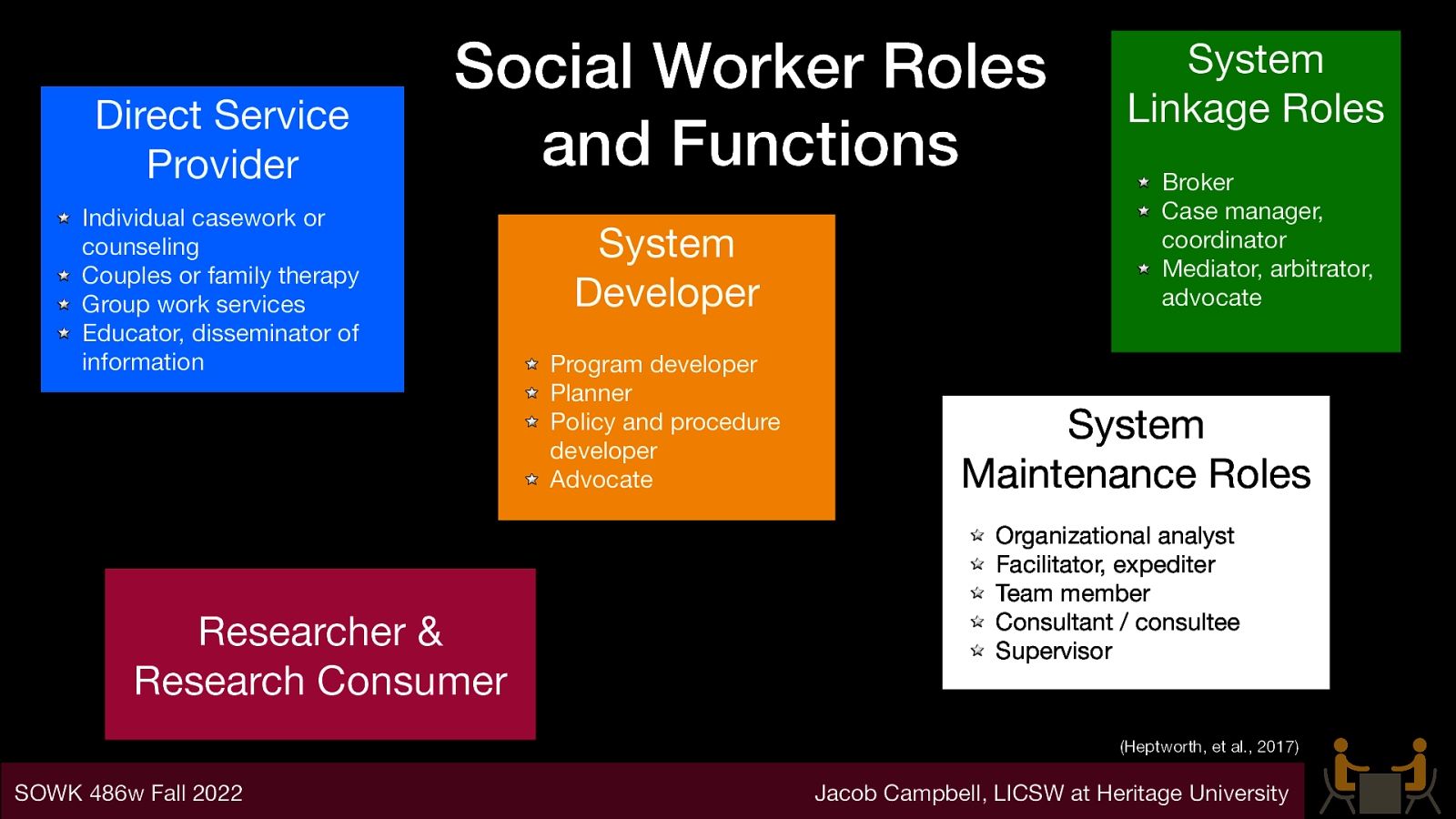
Direct Service Provider Social Worker Roles and Functions Individual casework or counseling Couples or family therapy Group work services Educator, disseminator of information Researcher & Research Consumer System Developer Program developer Planner Policy and procedure developer Advocate System Linkage Roles Broker Case manager, coordinator Mediator, arbitrator, advocate System Maintenance Roles Organizational analyst Facilitator, expediter Team member Consultant / consultee Supervisor (Heptworth, et al., 2017) SOWK 486w Fall 2022 Jacob Campbell, LICSW at Heritage University